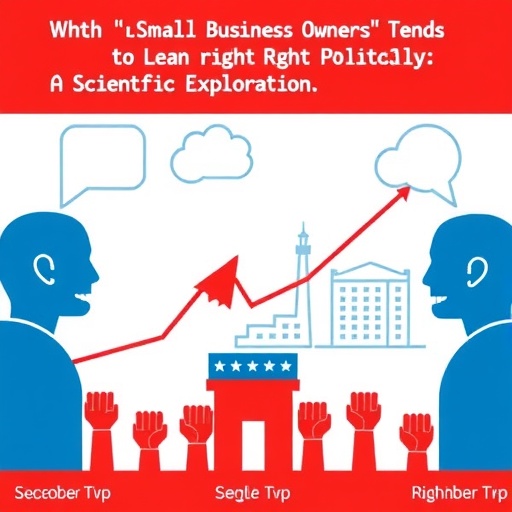A groundbreaking new study published in the British Journal of Political Science provides compelling evidence that small business owners in the United States are significantly more inclined to align with right-wing political parties. The research, led by Professor Neil Malhotra of Stanford University’s Graduate School of Business, elucidates that this political orientation is less about inherent personal characteristics and more deeply rooted in the lived experiences of managing a small business, particularly the challenges posed by government regulation. This nuanced understanding redefines longstanding assumptions about the political behavior of entrepreneurs and the socio-economic factors that shape voting patterns.
The study’s comprehensive analysis reveals that the act of owning and operating a small business fundamentally influences political leanings. Unlike former business owners, individuals who are currently running small enterprises demonstrate a marked rightward shift in their political affiliations, compared to those who have never owned a business. This distinction highlights the ongoing pressures and regulatory burdens faced by today’s entrepreneurs, which seem to act as catalysts in their political realignment. Intriguingly, the research also distinguishes between heirs of family businesses and founders of new ventures, uncovering that those who inherit businesses exhibit greater tendencies toward conservatism.
With the research methodology grounded in rigorous, diverse data sources, this study stands out for its innovative design. The authors utilized an original, bespoke survey specifically targeting recipients of the US Paycheck Protection Program—a novel sampling frame representing small business owners during the economic upheavals precipitated by the COVID-19 pandemic. Complementing this, the study drew from generalized national surveys, cross-national comparative data, and extensive occupational data on partisan registrations and political donations. This multilayered approach lends a robust empirical foundation to the study’s conclusions.
Professor Malhotra emphasizes that the primary driver of the conservative tilt among small business owners is the intensified interaction with the regulatory state. Unlike typical wage employees, entrepreneurs face multifaceted compliance requirements—from labor laws and occupational safety standards to complex tax codes—creating a persistent and unique set of pressures. These regulatory encounters foster a defensive posture vis-à-vis government, nudging small business owners toward political parties promising deregulation and reduced governmental oversight.
Another compelling dimension explored by the study is the potential political impact of the rapidly expanding gig economy. As labor markets evolve, an increasing portion of the workforce embodies characteristics traditionally associated with small business owners: autonomy, operational responsibility, and economic precarity. Gig workers, who balance greater flexibility with financial instability, may mirror the political dynamics observed among traditional small entrepreneurs. Professor Malhotra suggests this evolution could reshape the political landscape by potentially broadening the right’s appeal or alternatively, providing an opening for progressive parties to advocate for enhanced social protections.
The research also delves into the socioeconomic complexities within the small business owner demographic, shining a spotlight on a group the study designates as “High Income Low Education” (HILE). This classification refers to individuals earning above-median incomes despite lacking college degrees—a phenomenon often linked to successful small business ownership. HILEs constitute a disproportionately large segment of small business owners and exhibit stronger Republican Party identification and support for conservative candidates like Donald Trump. This intersection of income and education challenges traditional voter demographic models and underscores the economic distinctiveness of the small business sector.
Industry-specific political orientations among small business owners further enrich the study’s findings. Small enterprises operating within creative and individualistic professions, such as therapy, massage, and graphic design, tend to lean Democratic. These sectors, predominantly composed of sole proprietors, experience fewer regulatory entanglements and may prioritize social and cultural issues differently. In sharp contrast, small business owners entrenched in complex, regulation-heavy industries like construction, healthcare, and manufacturing display a pronounced conservative bias, likely reflecting firsthand encounters with compliance burdens and labor regulations.
These layered insights advance our understanding of how economic roles intersect with political identity. Small business ownership is not merely a marker of economic status but a dynamic experience shaping political worldviews through daily operational realities. The study’s findings defy simplistic narratives that align political preferences solely with socioeconomic background or educational attainment, emphasizing instead the causative impact of occupational experience.
Moreover, the paper challenges prior assumptions that political leanings of entrepreneurs are mainly predetermined by family background or cultural heritage. Rather, it is the real-time negotiations with governmental policies and regulatory frameworks that recalibrate political attitudes. For example, business owners who inherit enterprises, instead of founding them, tend to be more conservative, possibly due to legacy perspectives on property rights and established business cultures which reinforce defensive political stances.
The implications of this research extend beyond academic discourse, potentially informing political strategy and public policy. Understanding that regulatory experiences drive political preferences among a growing segment of the electorate underscores the practical importance of government policies on small businesses. Political parties targeting these voters might benefit by addressing regulatory reform, tax policies, and support structures that resonate with entrepreneurial realities.
Lastly, the study’s timing amidst significant economic shifts, including those catalyzed by the COVID-19 pandemic and the subsequent rise of the gig economy, positions it as a critical contribution to contemporary political science. As the labor market transforms and new economic actors emerge, this research sets the stage for tracking how evolving work arrangements influence party politics and voter behavior.
In summation, this landmark study presents a comprehensive, empirically grounded analysis revealing that small business ownership fundamentally shapes political ideology through the prism of regulatory experience. Its layered and multifaceted approach challenges conventional wisdom, providing fresh perspectives on the political economy of entrepreneurship and its broader societal ramifications.
Subject of Research: People
Article Title: The Politics of Small Business Owners
News Publication Date: 18-Jul-2025
Web References:
References: British Journal of Political Science, Volume Issue TBD, 2025
Keywords: Political science, Business, Economics, Elections, Sociology




